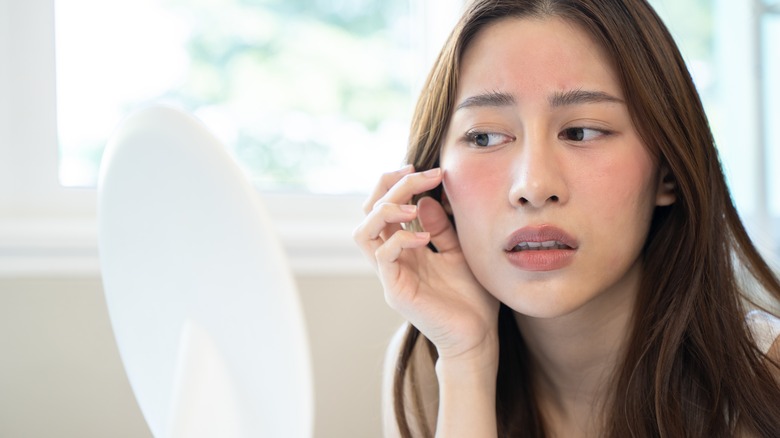What's The Difference Between Dehydrated And Dry Skin?
Skin can be a little finicky. We tend to our skin with love and care by learning what it wants and needs and doing our best to oblige. We sleep for it, eat for it, drink water for it, and lather it with lotions and potions. And often, this helps to keep it happy! But sometimes we experience challenges with our skin despite our best efforts.
When our skin is scaly and flaky, we might describe it as dry or dehydrated. But in reality, dry skin and dehydrated skin are two different conditions with two different causes. Healthline reports that dehydrated skin is a condition in which the skin lacks water, while dry skin is actually a skin type in which the skin exhibits a deficiency in natural oils (otherwise known as sebum). Let's take a look at the difference between dry and dehydrated skin and the best practices for treating each of them.
Taking care of dry skin
While walking down the skin care aisle, you might've noticed that products often declare that they're best suited for one particular skin type or another. There are four main skin types: oily, dry, combination, and normal (per Healthline). While people are generally born with a particular skin type, it is apt to fluctuate with age and the changing of seasons.
Medical News Today explains that ultimately, dry skin is a result of the sebaceous glands not producing enough sebum –- an oily substance made up of lipids (fat molecules). Sebum is released from the sebaceous gland into the follicular ducts of individual hair follicles. As hair grows, it takes the sebum with it until it reaches the surface of the skin, where it protects against harmful pathogens, transports antioxidants, and locks in moisture. The underproduction of sebum can cause dry, flaky, and itchy skin. When speaking with Allure, board-certified dermatologist Ross C. Radusky noted that general discomfort is a major sign of dryness.
To treat dry skin, the American Academy of Dermatology recommends bathing with warm (not hot) water. They also recommend using a gentle, fragrance-free cleanser, moisturizing after bathing with a cream or ointment as opposed to lotions, and steering clear of products containing alcohol, alpha-hydroxy acid (AHA), fragrance, and retinoids.
Treating dehydrated skin
While dry skin tends to be a genetic skin type, dehydrated skin is a condition that occurs when your body — and skin — need more water (per Healthline). Dehydrated skin lacks hydration, not sebum. Because of this, London-based dermatologist Cristina Psomadakis told Women's Health that dehydrated skin can still feel oily to the touch, while still flaking or giving off a dull appearance. Healthline notes that people with dehydrated skin may also present symptoms like dark circles under their eyes, sunken eyes, shadows around the face, and increased appearance of fine lines and wrinkles.
Dr. Psomadakis describes the pinch test as one easy way to tell if your skin is dehydrated. If you pinch the skin on your forearm and there's a delay in it snapping back into shape, that's a good indicator that you're dehydrated.
Making sure you're drinking enough glasses of water each day is only the first step in treating dehydrated skin. To maintain hydration, Healthline also recommends lifestyle changes like drinking alcohol only in moderation, limiting caffeine intake, abstaining from smoking, and getting plenty of sleep. Regular exercise is also necessary, but keep water on hand. Make sure to drink a few sips of water every 20 minutes while exercising, and replenish fluids post-workout.



